- Home
- Milan Kundera
Let the Old Dead Make Room for the New Dead
Let the Old Dead Make Room for the New Dead Read online
Let the Old Dead Make Room for the Young Dead
by Milan Kundera
from Laughable Loves
This translation 1999 Aaron Asher
1
He was returning home along the street of a small Bohemian town, where he had been living for several years, reconciled to his not-too-exciting life, his backbiting neighbors, and the monotonous rowdiness that surrounded him at work, and he was walking so totally without seeing (as one walks along a path traversed a hundred times) that he almost passed her by. But she had already recognized him from a distance, and coming toward him she gave him that gentle smile of hers; only at the last moment, when they had almost passed each other, did the smile ring a bell in his memory and snap him out of his drowsy state.
"I wouldn't have recognized you!" he apologized, but it was a awkward apology, because it brought them precipitously to a painful subject, about which it would have been advisable to keep silent; they had not seen each other for fifteen years and during this time they had both aged. "Have I changed so much?" she asked, and he replied that she hadn't, and even if this was a lie it wasn't an out-and-out lie, because that gentle smile (expressing demurely and restrainedly a capacity for some sort of eternal enthusiasm) emerged from the distance of many years quite unchanged, and it confused him: it evoked for him so distinctly the former appearance of this woman that he had to make a definite effort to disregard it and to see her as she was now: she was almost an old woman.
He asked her where she was going and what was on her schedule, and she replied that she had nothing else to do but wait for the train that would take her back to Prague that evening. He evinced pleasure at their unexpected meeting, and because they agreed (with good reason) that the two local cafes were overcrowded and dirty, he invited her to his bachelor apartment, which wasn't very far away; he had both coffee and tea there, and, more important, it was clean and peaceful.
2
Right from the start it had been a bad day. Her husband (twenty-five years ago she had lived here with him for a short time as a new bride, then they had moved to Prague, where he'd died ten years back) was buried, thanks to an eccentric wish in his last will and testament, in the local cemetery. At that time she had paid in advance for a ten-year lease on the grave, but a few days before, she had become afraid that the time limit had expired and that she had forgotten to renew the lease. Her first impulse had been to write the cemetery administration, but then she had realized how futile it was to correspond with the authorities, and she had come out here.
She knew the path to her husband's grave from memory, and yet today she felt all as if she was in this cemetery for the first time. She couldn't find the grave, and it seemed to her that she had gone astray. It took her a while to understand. There, where the gray sandstone monument with the name of her husband in gold lettering used to be, precisely on that spot (she confidently recognized the two neighboring graves) now stood a black marble headstone with a quite different name in gilt.
Upset, she went to the cemetery administration. There they told her that upon expiration of the leases, the graves were canceled. She reproached them for not have advised her that she should renew the lease, and they replied that there was little room in the cemetery and that the old dead must make room for the young dead. This exasperated her, and she told them, holding back her tears, that they knew absolutely nothing of human dignity or respect for others, but she understood that the conversation was useless. Just as she could not have prevented her husband's death, so also she was defenseless against his second death, this death of an old dead who is now forbidden to exist even as dead.
She went off into town, and anxiety quickly began to mingle with her sorrow as she tried to imagine how she would explain to her son the disappearance of his father's grave and how she would justify her neglect. At last fatigue overtook her: she didn't know how to pass the long hours until time for the departure of her train, for she no longer knew anyone here, and nothing encouraged her to take even a sentimental stroll, because over the years the town had changed too much, and the once familiar places looked quite strange to her now. That is why she gratefully accepted the invitation of the (half-forgotten) old acquaintance she'd met by chance: She could wash her hands in his bathroom and then sit in his soft armchair (her legs ached), look around his room, and listen to the boiling water bubbling away behind the screen that separated the kitchen nook from the room.
3
Not long ago he had turned thirty-five, and exactly at that time he had noticed that the hair on top of his head was thinning very visibly. The bald spot wasn't there yet, but its appearance was quite conceivable (the scalp was showing beneath the hair) and, more important, it was certain to appear and in the not-too-distant future. Certainly it was ridiculous to make thinning hair a matter of life or death, but he realized that baldness would change his face and that his hitherto youthful appearance (undeniably his best) was on its way out. And now these considerations made him think about how the balance sheet of this person (with hair), who was going away bit by bit, actually stood, what he had actually experienced and enjoyed. What astounded him was the knowledge that he had experienced rather little; when he thought about this he felt embarrassed; yes, he was ashamed, because to live here on earth so long and to experience so little was ignominious.
What did he actually mean when he said to himself that he had not experienced much? Did he mean by this travel, work, public service, sports, women? Of course he meant all of these things; yet, above all, women; because if his life was deficient in other spheres it certainly upset him, but he didn't have to lay the blame for it on himself; anyhow, not for work that was uninteresting and without prospects; not for curtailing his travels because he didn't have money or reliable party references; finally, not even for the fact that when he was twenty he had injured his knee and had had to give up sports, which he had enjoyed. On the other hand, the realm of women was for him a sphere of relative freedom, and that being so, he couldn't make any excuses about it; here he could have demonstrated his wealth; women became for him the one legitimate criterion of life's density.
But no such luck! Things had gone somewhat badly for him with women: Until he was twenty-five (though he was a good-looking guy) shyness would tie him up in knots; then he fell in love, got married, and after seven years had persuaded himself that it was possible to find the infinity of erotic possibilities in one woman; then he got divorced and the one-woman apologetics (and the illusion of infinity) melted away, and in their place came an agreeable taste for and boldness in the pursuit of women (a pursuit of their varied finiteness); unfortunately his bad financial situation frustrated his newfound desires (he had to pay his former wife for the support of a child he was allowed to see once or twice a year), and conditions in the small town were such that the curiosity of the neighbors was as enormous as the choice of women was scant.
And time was already passing very quickly, and all at once he was standing in the bathroom in front of the oval mirror located above the washbasin; in his right hand he held over his head a round mirror and was transfixed examining the bald spot that had begun to appear; this sight suddenly (without preparation) brought home to him the banal truth that what he'd missed couldn't be made good. He found himself in a state of chronic ill humor and was even assailed by thoughts of suicide. Naturally (and it is necessary to emphasize this, in order not to see him as a hysterical or stupid person), he appreciated the comic aspects of these thoughts, and he knew that he would never carry them out (he laughed inwardly at his own suicide note: I won't put up with my bald spot. Farewell!), but it is enough that these thoughts, however plato
nic they may have been, assailed him at all. Let us try to understand: the thoughts made themselves felt within him perhaps as the overwhelming desire to give up the race makes itself felt within a marathon runner, when halfway through he discovers that shamefully (and moreover through his own fault, his own blunders) he is losing. He also considered his race lost, and he didn't feel like running any farther.
And now he bent down over the small table and placed one cup of coffee on it in front of the couch (on which he was going to sit down), the other in front of the armchair, in which his visitor was sitting, and said to himself that there was a strange spitefulness in the fact that he had encountered this woman, with whom he had once been madly in love and whom he had allowed to escape him (through his own fault), encountered her precisely when he found himself in this state of mind and at a time when it was no longer possible to recapture anything.
4
She would hardly have guessed that in his eyes she was the one who had escaped him; still, she had always remembered the night they had spent together; she remembered how he had looked then (he was twenty, didn't know how to dress, used to blush, and his boyishness amused her); and she remembered what she had been like (she had been almost forty, and a thirst for beauty drove her into the arms of other men, but also drove her away from them; she had always thought that her life should have resembled a delightful ball, and she feared that her unfaithfulness to her husband might turn into an ugly habit).
Yes, she had decreed beauty for herself, as people decree moral injunctions for themselves; if she had noticed any ugliness in her own life, she would perhaps have fallen into despair. And because she was now aware that after fifteen years she must seem old to her host (with all the ugliness that this brings with it), she wanted quickly to unfold an imaginary fan in front of her face, and to this end she deluged him with questions: she asked him how he had come to this town; she asked him about his job; she complimented him on the coziness of his bachelor apartment, and praised the view from the window over the rooftops of the town (she said that it was of course no special view, but that there was an airiness and freedom about it). She named the painters of several framed reproductions of impressionist pictures (this was not difficult, in the apartments of most poor Czech intellectuals one was certain to find these cheap prints), then she got up from the table with her unfinished cup of coffee in her hand and bent over a small writing desk, on which were a few photographs in a stand (it didn't escape her that among them there was no photo of a young woman), and she asked whether the face of the old woman in one of them belonged to his mother (he confirmed this).
Then he asked her what she had meant when she had told him earlier that she had come here to take care of some things. She really dreaded speaking about the cemetery (here on the sixth floor she not only felt high above the roofs, but also pleasantly high above her own life); when he insisted, though, she finally confessed (but very briefly, because the immodesty of hasty frankness had always been foreign to her) that she had lived here many years before, that her husband was buried here (she was silent about the cancellation of the grave), and that she and her son had been coming here for the last ten years without fail on All Souls' Day.
5
"Every year?" This statement saddened him, and once again he thought of the spitefulness of fate; if only he'd met her six years ago when he'd moved here, everything could have been possible; she wouldn't have been so marked by age, her appearance wouldn't have been so different from the image he had of the woman he had loved fifteen years before; it would have been within his power to surmount the difference and perceive both images (the image of the past and that of the present) as one. But now they stood hopelessly far apart.
She drank her coffee and talked. He tried hard to determine precisely the extent of the transformation by means of which she was escaping him for the second time: her face was wrinkled (in vain did the layer of powder try to deny this); her neck was withered (in vain did the high collar try to hide this); her cheeks sagged; her hair (but it was almost beautiful!) had grown gray; however, her hands drew his attention most of all (unfortunately, it was not possible to touch them up with powder or paint): bunches of blue veins stood out on them, so that all at once they were the hands of a man.
In him pity was mixed with anger, and he felt like drowning their too-long-put-off meeting in alcohol; he asked her if she wanted some cognac (he had an opened bottle in the cabinet behind the screen); she replied that she didn't, and he remembered that even fifteen years before she had drunk almost not at all, perhaps so that alcohol wouldn't make her behave contrary to the demands of good taste and decorum. And when he saw the delicate movement of her hand with which she refused the offer of cognac, he realized that this charm, this magic, this grace, which had enraptured him, was still the same in her, though hidden beneath the mask of old age, and was in itself still attractive, even though it was behind a grille.
When it crossed his mind that this was the grille of age, he felt immense pity for her, and this pity brought her nearer to him (this woman who had once been so dazzling, before whom he used to be tongue-tied), and he wanted to have a conversation with her and to talk the way a friend talks with a friend, at length, in a blue atmosphere of melancholy resignation. He started to talk (and it did indeed turn into a long talk) and eventually he got to the pessimistic thoughts that had visited him of late. Naturally he was silent about the bald spot that was beginning to appear (it was just like her silence about the canceled grave); on the other hand the vision of the bald spot was transubstantiated into quasi-philosophical maxims to the effect that time passes more quickly than man is able to live, and that life is terrible, because everything in it is necessarily doomed to extinction; he voiced these and similar maxims, to which he awaited a sympathetic response; but he didn't get it.
"I don't like that kind of talk," she said almost vehemently. "Everything you've been saying is awfully superficial."
6
She didn't like conversations about growing old or dying, because they contained images of physical ugliness, which went against the grain with her. Several times, almost in a fluster, she repeated to her host that his opinions were superficial; after all, she said, a man is more than just a body that wastes away, a man's work is substantial and that is what he leaves behind for others. Her advocacy of this opinion wasn't new; it had first come to her aid when, thirty years earlier, she had fallen in love with her former husband, who was nineteen years older than she. She had never ceased to respect him wholeheartedly (in spite of all her infidelities, about which he either didn't know or didn't want to know), and she took pains to convince herself that her husband's intellect and importance would fully outweigh the heavy load of his years.
"What kind of work, I ask you? What kind of work do we leave behind?" protested her host with a bitter laugh.
She didn't want to refer to her dead husband, though she firmly believed in the lasting value of everything that he had accomplished; she therefore only said that every man accomplishes something, which in itself may be most modest, but that in this and only in this is his value; then she went on to talk about herself, how she worked in a house of culture in a suburb of Prague, how she organized lectures and poetry readings; she spoke (with an excitement that seemed out of proportion to him) about "the grateful faces" of the public; then she expatiated on how beautiful it was to have a son and to see her own features (her son looked like her) changing into the face of a man; how it was beautiful to give him everything that a mother can give a son and then to fade quietly into the background of his life.
It was not by chance that she had begun to talk about her son, because all day her son had been in her thoughts, a reproachful reminder of the morning's failure at the cemetery; it was strange; she had never let any man impose his will on her, but her own son subjugated her, and she didn't understand how. The failure at the cemetery had upset her so much today, above all because she felt guilty before him and feared his r
eproaches. Of course she had long suspected that her son so jealously watched over the way she honored his father's memory (it was he who insisted every All Souls' Day that they should not fail to visit the cemetery!), not so much out of love for his dead father as from a desire to usurp his mother, to assign her to a widow's proper confines. For that's how it was, even if he never voiced it and she tried hard (without success) not to know it: the idea that his mother could still have a sex life disgusted him: everything in her that remained sexual (at least in the realm of possibility and chance) disgusted him, and because the idea of sex is connected with the idea of youthfulness, he was disgusted by everything that was still youthful in her; he was no longer a child, and his mother's youthfulness (combined with the aggressiveness of her motherly care) disagreeably thwarted his relationship with girls, who had begun to interest him; he wanted to have an old mother; only from such a mother would he tolerate love, and it was only such a mother he was capable of loving. And although at times she realized that in this way he was pushing her toward the grave, she had finally submitted to him, succumbed to his pressure, and even idealized her capitulation, persuading herself that the beauty of her life consisted precisely in quietly fading out in the shadow of another life. In the name of this idealization (without which the wrinkles on her face would have made her far more uneasy), she now conducted with such unexpected warmth this dispute with her host.
But her host suddenly leaned across the low table that stood between them, stroked her hand, and said: "Forgive my chatter. You know that I always was an idiot."
7
Their dispute didn't irritate him; on the contrary his visitor yet again confirmed her identity for him. In her protest against his pessimistic talk (wasn't this above all a protest against ugliness and bad taste?), he recognized her as the person he had once known, so her former appearance and their old adventure filled his thoughts all the more. Now he wished only that nothing destroy the intimate mood, so favorable to their conversation (for that reason he stroked her hand and called himself an idiot), and he wanted to tell her about the thing that seemed most important to him at this moment: their adventure together. For he was convinced that he had experienced something very special with her, which she didn't suspect and which he himself with difficulty would now try to put into precise words.

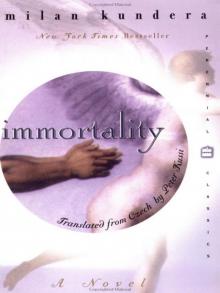 Immortality
Immortality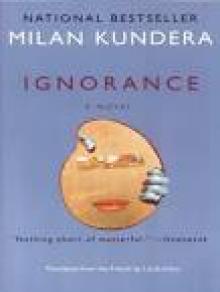 Dr. Havel After Twenty Years
Dr. Havel After Twenty Years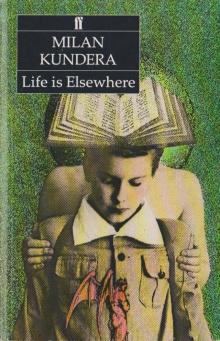 Life Is Elsewhere
Life Is Elsewhere Laughable Loves
Laughable Loves Symposium
Symposium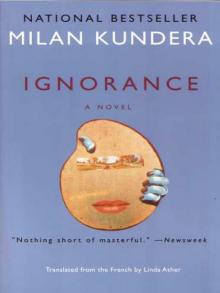 Ignorance
Ignorance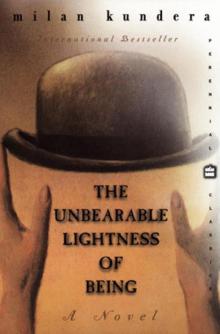 The Unbearable Lightness of Being
The Unbearable Lightness of Being Nobody Will Laugh
Nobody Will Laugh Jacques and His Master: An Homage to Diderot in Three Acts
Jacques and His Master: An Homage to Diderot in Three Acts The Golden Apple of Eternal Desire
The Golden Apple of Eternal Desire Eduard & God
Eduard & God Slowness
Slowness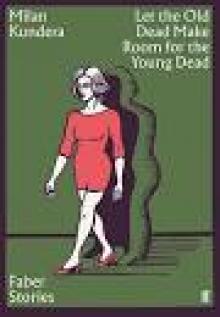 Let the Old Dead Make Room for the New Dead
Let the Old Dead Make Room for the New Dead Farewell Waltz
Farewell Waltz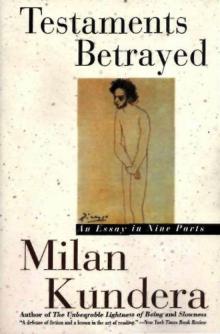 Testaments Betrayed: An Essay in Nine Parts
Testaments Betrayed: An Essay in Nine Parts